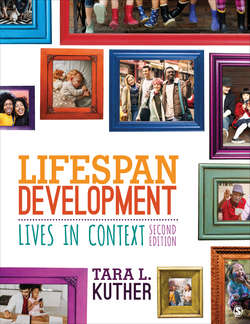Читать книгу Lifespan Development - Tara L. Kuther - Страница 283
На сайте Литреса книга снята с продажи.
Learning Theory and Language Development
ОглавлениеBaby Howie gurgles, “Babababa!” His parents encourage him excitedly, “Say bottle; ba-ba!” Howie squeals, “Babababa!” “Yes! You want your ba-ba!” Parents play an important role in language development. They provide specific instruction and communicate excitement about their infants’ developing competence, encouraging infants to practice new language skills. Learning theorist B. F. Skinner (1957) proposed that language, just like all other behaviors, is learned through operant conditioning: reinforcement and punishment. From birth, infants make sounds at random. Caregivers respond to infants’ early utterances with interest and attention, imitating and reinforcing their verbal behavior (Pelaez, Virues-Ortega, & Gewirtz, 2011; Petursdottir & Mellor, 2017). Infants repeat the sounds. Caregivers then reward sounds that resemble adult speech with attention, smiles, and affection. Infants imitate sounds that adults make and repeat sounds that are reinforced. From this perspective, imitation and reinforcement shape children’s language development. The quantity and quality of the parents’ verbal interactions with the child and responses to the child’s communication attempts influence the child’s rate of language development (Hoff, 2015).
In the view of learning theorists, then, infants learn by observing the world around them and adults encourage and reinforce their language learning. However, critics point out that learning theory cannot account for all of language development because it cannot account for the unique utterances and errors that young children make (Berwick, Chomsky, & Piattelli-Palmarini, 2013). Word combinations are complex and varied—they cannot be acquired solely by imitation and reinforcement. Toddlers often put words together in ways that they likely have never heard (e.g., “Mommy milk”). Young children make grammatical errors, such as “mouses” instead of “mice” or “goed” instead of “went,” that cannot be the result of imitation. If language is learned through imitation, how do young children make grammatical errors that they have never heard spoken? Young children repeat things that they hear (sometimes to parents’ chagrin!), but they also construct new phrases and utterances that are unique. Reinforcement from parents and caregivers is powerful encouragement for children, but language development cannot be completely explained by learning theory alone. Despite wide variations in circumstances, living situations, and contexts, infants around the world achieve language milestones at about the same ages, suggesting a biological component to language development.
